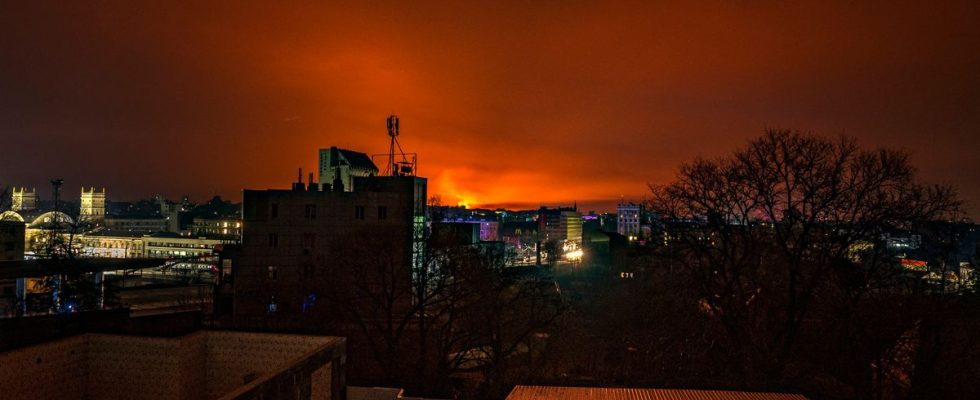In Ukraine, the sun rises along with the countdown of Russian bombings. Moscow does not wait for the glow of dawn to light up the sky with deadly orange streaks. For 700 days, the war has raged. And for 700 nights, Ukrainian cities have slept to the sound of anti-aircraft alarms. During the night from Monday to Tuesday, 41 missiles targeted the country, killing at least 18 civilians and injuring 130 others. The following night, at least nine people were injured in nighttime bombings on Kharkiv, in the northeast of the country.
“Saturating Ukrainian air defense”
By bombing at night, the Russians maintain pressure on Ukrainian air defense systems. “Whether they are drones or missiles, at night they are less easily spotted. It is therefore more complicated and more stressful,” explains Yves Boyer, associate researcher in geopolitics at the Foundation for Strategic Research. With their night attacks, the Russians hope to slip more easily through the cracks of the anti-aircraft net. “Even with today’s technologies, it is easier to spot daytime attacks,” underlines Cyrille Bret. And “the Russians want to saturate the anti-aircraft defense which is subject to so many attacks that it no longer knows how to prioritize,” adds the geopolitician and researcher at the Jacques-Delors European Research Institute.
Even more strategic, they send inexpensive missiles and drones into the night skies of Ukraine, in the hope that they will be hit by much more expensive munitions. “During the day and when it comes to slow drones, you shoot on sight with classic, light artillery. At night, they are a little more difficult to intercept, explains Jean de Gliniasty, research director at the Institute of International and Strategic Relations and former ambassador to Russia. Shahed drones are easily intercepted with advanced technologies but it is not profitable. They cost between 10,000 and 20,000 dollars [de à 9.100 à 18.300 euros environ] so if the Ukrainians spend 300,000 or 400,000 euros on ammunition to shoot them down, it’s a material victory for Moscow! »
Spotting the Ukrainian defense
And when Ukrainian anti-aircraft batteries fire to defend themselves from strikes, the Russian army watches. “At night, the light signal cannot be hidden. When there is a response, it is easier to see where these shots are coming from,” notes Yves Boyer. This is therefore one of the reasons for night shelling: “to identify the origin of the anti-aircraft fire”.
Hence the use of incessant salvos which make the walls shake and alarms blare, disturbing the sleep of Ukrainians for almost two years. “It’s exhausting for the population. In this logic of saturation, there is also the desire to undermine the morale of the adversary,” notes Jean de Gliniasty. Especially since the nighttime strikes, which sometimes catch civilians in their sleep, also leave a feeling of insecurity in people’s hearts. “At night, the strikes terrorize the population even more, it wears down morale,” notes Cyrille Bret.
Tiring those “who hold the bridge”
“It contributes to the wear and tear of Ukraine as a state and military entity. We feel the extreme fatigue which is gaining on them little by little”, estimates Yves Boyer even if this technique “exhausts above all the anti-aircraft defense soldiers”, according to Cyrille Bret who asserts: “there is no rest at night . Anti-aircraft defense never rests. » An analysis shared by Yves Boyer: “Night bombings are more stressful for those in command, they have to be kept alert and the responsibility is heavy to bear. One of the interests is obviously to tire out the people who hold the bridge. »
“This is not a new process. When you are at war, you try to win with strategies, some of which are proven,” notes Yves Boyer. During the Second World War, the Allies frequently bombed at night. However, “the fighting takes place in the cities in Ukraine, not in the countryside. However, in the event of urban combat, it is very costly in terms of men to opt for land assaults. The logic of urban combat is therefore to shell, with a terrible number of civilian victims, as in Gaza,” analyzes Jean de Gliniasty. It is therefore difficult to imagine peaceful nights for Ukrainians in the weeks and months to come.

